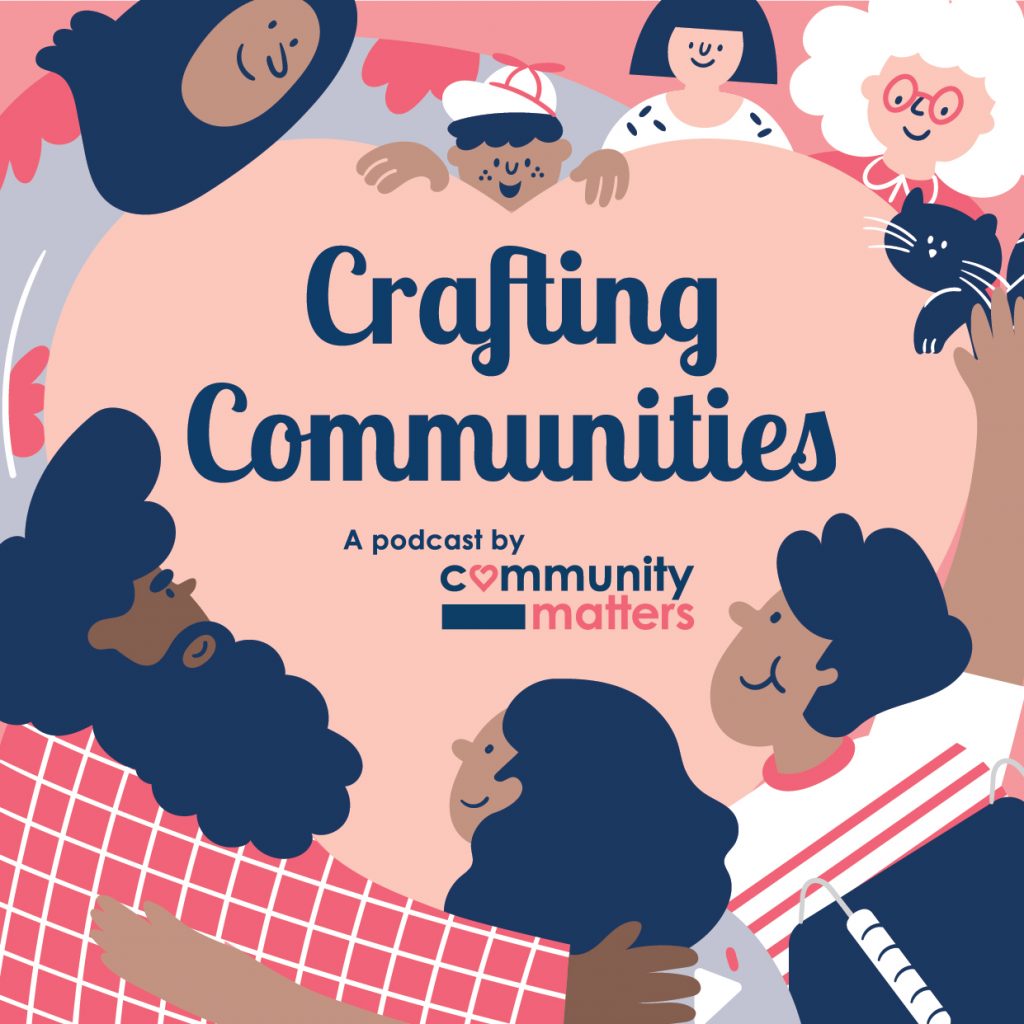Transcript
Grace Ann Chua 00:04 Have you ever had a burnout? It’s an all-too-common experience and it gets to the best of us. What causes it and how can we support someone experiencing it? Welcome to Crafting Communities, your podcast companion to shape a better experience for the people that you care about. I’m your host and friend, Grace. In this episode, Megan from Limitless joins me again to dive into the issue of burnout. We’ll be exploring the basics, recovery tips, and share our own personal experiences.
Grace Ann Chua 00:33 Hey, Megan. Thanks for joining us for this episode of Crafting Communities.
Megan Tang 00:36 Hi Grace. Very happy to be back here.
Grace Ann Chua 00:05 So, to begin, could you introduce yourself to us?
Megan Tang 00:41 My name is Megan, and I’m from a nonprofit organization called Limitless. We provide pro bono and subsidized services for youth aged 12 to 25 in the area of mental health. I’m a counselor/caseworker, and I’m also leading the outreach team.
Grace Ann Chua 00:56 Cool. In today’s episode, we’re going to deep dive into the topic of burnout. What is burnout?
Megan Tang 01:00 I think burnout is something that most people have heard of, but it’s quite difficult to define. So how we see burnout is we look at three different components of it. It’s exhaustion, cynicism, and then reduced efficacy. If I were to put it in simple terms, just imagine you’re so exhausted and tired from your job that you start to dislike your job, and find that the tasks that you do are no longer meaningful, which then lead to a lower productivity level.
Grace Ann Chua 01:30 Who gets burnt out?
Megan Tang 01:32 Anyone can get burnt out, it really depends on the circumstances, and of course, life events that we may go through. But just as how mental health is not prejudiced, burnout is also not prejudiced.
Grace Ann Chua 01:42 What are the different causes of burnout then?
Megan Tang 01:45 I usually look at it as a stress injury. It can be from different types of events in life, or different crisis that you may go through, whether it’s financial, being a sole breadwinner and then losing your job, which then in turn harms your family, whether it’s a life-threatening event and someone is trying to deal with their circumstances at the same time. That will be something that could be more prolonged, or even something that is intense. And then a person kind of has a hard time recovering from the event.
Grace Ann Chua 02:15 Basically just a wide range of situations, from your work to situations in your personal life to finances to health related.
Megan Tang 02:23 Yeah, so it usually happens when the stressors are still there. When it’s a prolonged stressor, then usually that leads to burnout more so.
Grace Ann Chua 02:32 Have you ever experienced burnout?
Megan Tang 02:35 I have actually experienced two events of burnout in my life. The first was when I was younger, and I had just started a job and I was also studying and doing my degree part-time. And I was in a work culture that wasn’t very healthy. So, I will get discriminated a lot. And there was some unfair treatment, which made me very anxious to go to work. So, I think that handling my schoolwork at the same time as also going to work made it very difficult for me. And just that dread every day and having to deal with that dread everyday was very tiring. So, I think that the tiredness led to that burnout to a point where I would actually cry a lot when I had to go to work, when I had to take a break from doing my thesis. So, that was my earliest experience with burnout.
Megan Tang 03:27 The second one was actually during COVID period.
Grace Ann Chua 03:29 Pretty recently.
Megan Tang 03:31 Yeah, pretty recently. I actually really love my job at Limitless, I must say that so my boss can hear me. [laughter] But I really do love my job. I love the organization, I love our staff and our clients. And I think what happened during COVID was that a lot of our clients were experiencing very painful circumstances, especially those that were having issues at home, because they will be stuck in the environment during the lockdown period and I was seeing maybe up to nine clients a day. It was eating into my own personal time. And because I’m working from home as well, I couldn’t break that association from work even after I was done with work.
Grace Ann Chua 04:10 Yeah, because there’s no break, there was no going home, there was no change of environment.
Megan Tang 04:14 Yes, I was just stuck in my room, and at that time, I was still staying with my parents. It’s a five-room flat, but there are, let me count, six of us in the house, so it felt quite crowded at that time. And the thing about it was also that a lot of clients became higher risk, because they were going through a lot as well. So, I was dealing with suicidality, and eventually, it led to someone even taking their life, and I was very invested in this case. So, I think what led to the burnout was, yes, I had that one intense experience of the person taking their life, but also, I didn’t take the time to grieve and process it. And it’s really strange to grieve as a professional, because it’s not the same as like losing a loved one or a friend or a family member. So, I kind of wasn’t sure what to do with my emotions at that point of time.
Grace Ann Chua 05:05 How is it any different, though? I mean, they’re still a human being, they’re still someone that you’ve built a relationship with.
Megan Tang 05:11 It is but because it’s not a personal relationship, you don’t know how you’re feeling about it. You’re trying to make sense of that sadness and the fear as well because you have to write your case notes or reports and keep everything intact, and make sure that if you were to be called to court you will have the right things to say.
Grace Ann Chua 05:28 So, it was a new experience for you, new emotions, new professional relationships having to navigate, and just overwhelmed and prolonged.
Megan Tang 05:37 Yes, and it got prolonged because I still continued to see nine clients a day and still put my own care aside. And I felt that I didn’t have that space to just make sense of things.
Grace Ann Chua 05:48 At what point did you realize that you are burnt out, though, like even in both situations?
Megan Tang 05:52 When I started crying a lot. I’m a crier from my first burnout until now. I think also my relationships with my loved ones got affected. Okay, so this is where I may overshare and get a bit personal. But I myself have lived experience, which means I’m also diagnosed. I actually have OCD and I have bipolar. And I knew that it was burnout when I started to regress in these two conditions.
Grace Ann Chua 06:16 Okay. So, that also takes a lot of self-awareness, right?
Megan Tang 06:19 Yes. So, that was really all thanks to my previous therapists who have helped me to this point and I could see that I started to have more mental rituals because of the OCD, and it was harder to control my emotions. I also felt very anxious when I had to work. And it was the first time I felt that way, because I really love my job. So, I’m the kind of person who like when I go holidays, when I go for vacations, I’m not upset to come back to work. So, it was a very different feeling for me, and I knew this was something else already.
Grace Ann Chua 06:47 And how did your organization react when they found out that you were going through a burnout?
Megan Tang 06:51 They were very supportive, all the way, even from that one intense incident, all the way through when I was struggling to handle my daily duties. I felt by that time, I knew that my organization provided a safe space for me to be open about what I was going through. So, my team was awesome, really. They asked how they could help me in my work, whether I could transfer any clients to someone who may be able to take it, whether a colleague could cover for me, and then maybe I could have a week off. So, they really did whatever they could to make me feel at ease with my situation. I was the only one shaming myself about it.
Grace Ann Chua 07:30 And I can imagine, I mean shame has different parts right? There’s definitely the internal pressure, but also public perception of others. And how is burnout generally perceived in the workplace?
Megan Tang 07:40 I think people view burnout as being incompetent a lot of times, and we don’t know how real burnout actually is, and how severe it can get to a point of leading, of course, to other mental health disorders such as depression or general anxiety disorder, and even suicidality. So, I think, because we don’t understand how serious it can be, we might be a bit dismissive towards it.
Grace Ann Chua 08:05 Just want to jump back to something earlier, you’re talking about the shame, right? So, how do you get over yourself?
Megan Tang 08:11 I think I really had to look inward and ask myself why I’m feeling so ashamed when nobody else was shaming me. And I think it came down to my self-expectations, which also, ironically, can lead to burnout.
Grace Ann Chua 08:22 Can you elaborate?
Megan Tang 08:24 So, for me when I see a lot of clients, sometimes they tell me how they feel about their self-expectations and like how no one is pushing them, but they feel they need to meet a certain goal, because maybe their identity thrives on it, or that’s how they see their self’s worth. So, because they keep pushing themselves so hard, they neglect other aspects of their life and then they end up with burnout. And then I’m like, “Yeah, I hear you. I really do, because I also feel the same way sometimes.” You’re asking me how I got over the shame, right?
Grace Ann Chua 08:52 Yeah, because you’re saying that internally, you’re the one who is shaming yourself for being burnt out.
Megan Tang 08:56 I think it was internal conflict for me of, okay, this is the time to just be vulnerable, and be honest with yourself, and do whatever you can to self-care right now because you want to bounce back versus, “No, I cannot ask for help, I have to be very independent, I have to be strong.” And I myself as an individual, I always look for productivity. When I’m unproductive, I get very upset at myself. But yeah, it’s something that I really had to just put aside and make a conscious decision on what is the priority, which was getting better at that point. I think that’s how I overcame the shame.
Grace Ann Chua 09:30 Thanks for sharing. So, what are some of the myths surrounding burnout?
Megan Tang 09:33 I talked about feeling incompetent. So people may think that an individual is just not very good at their job, or they’re just being lazy or they’re not trying hard enough, and that they are just using burnout as an excuse. Another thing could be that burnout is just something that is very easy to get over. So, maybe you just take a day off and then you’re fine the next day, but it’s not that simple. Other times people may think that it’s just mental but it’s physical as well. So, it’s what we call somatic when the psychological has an effect on the physical. So, coming into stressful situations or situations that present themselves as triggers or stressors for you, and then suddenly you realise, hey, I have a headache. Why am I getting a headache when I’m in a stressful situation? So that could be an example of the physical part of it.
Grace Ann Chua 10:18 If you’re burnt out, do you need professional help, or is it something that you can cope with or recover on your own?
Megan Tang 10:24 I think people have the misconception that professional help would only be for people who have diagnosed mental health condition. But I really believe that anyone can get professional help, because it’s not just about recovering from a disorder, it can be about self-improvement, it can be about learning how to manage better, coping in healthier ways. So, there’s nothing wrong with gaining new perspective as well, and just seeing someone. So, I do encourage a person with burnout to see a professional. Maybe they can guide them along in their recovery as well.
Grace Ann Chua 10:54 How long does their recovery journey take?
Megan Tang 10:56 It differs for every individual, but I think what is important is that you don’t force yourself to feel like you have to recover sooner. The final myth about burnout is that people think that depression and burnout are the same thing, but it is not. It just seems that way because there are a lot of similar signs and symptoms for both. I think the key difference with burnout is that when you take yourself away from that situation or that stressor, usually that recovery starts to happen a lot quicker.
Grace Ann Chua 11:24 How do you distinguish between being depressed and being burnt out?
Megan Tang 11:28 I think if you look at the time of when it started to happen and you can pinpoint a particular stressor, or if you track your mood, and it is related to something in your life. For example, every time you go to work, you feel upset, you feel like crying, you feel like you’re dreading it, and then you take a vacation and you feel fine on your vacation, then it’s got to be burnt out.
Grace Ann Chua 11:51 Ok, but if you are depressed, how would that be different? You would just still be depressed on your trip?
Megan Tang 11:57 Yes. Because it’s not something you can control when it comes to like the mood swings, when it comes to the other symptoms as well. It’s not as correlated to that particular stressor.
Grace Ann Chua 12:05 Okay. So, burnout is generally more correlated to a certain stressor.
Megan Tang 12:08 Yes, that has tired you out.
Grace Ann Chua 12:10 And if you remove that stressor, then that is one way to overcome it?
Megan Tang 12:14 Yes. But sometimes if the burnout gets prolonged, it can become clinical depression. Just the fact that it can lead to other mental health conditions, I think we want to look at how we can prevent that, rather than allowing it to become a mental health condition, and then taking more time to work back from there.
Grace Ann Chua 12:30 Thanks for sharing so much about the importance of being aware of burnout and understanding what burnout is. So, as a community leader, why should we be concerned about burning out? Earlier in your story, you were sharing about being very passionate about your job and dedicating so many hours to it, right? And for so many of our listeners, we are all leaders in different fields or different areas of our lives, and there’s so much passion to try forward the change that we hope to see in society, why is caring about burning out important?
Megan Tang 12:57 One thing that stuck with me that Asher, my boss, and the ED of Limitless, said was, “You’re not sprinting, it’s a marathon.” So, if this is something that I want to continue to do for a long time, I need to focus on how to sustain my rhythm rather than burning myself out. And I think also, people are watching, right? You have people that are your juniors, or maybe even people that you are managing, and if I burn out, then how am I going to care for them or how am I going to support them or set myself up as a good example of how to achieve your hopes and dreams and making it last.
Grace Ann Chua 13:31 It’s really about pacing yourself for the long journey ahead. If burnout is not addressed, what’s the consequence of that on the community or the organization?
Megan Tang 13:40 I can imagine if there was nobody to step in for me, some of the work that was so meaningful for me could have just been dropped, and there could have been no follow up. I also imagine that it might not look so good on the organization if we don’t practice what we preach. And of course, it can also bleed into taking a toll on other colleagues or people around me because they have to cover for me. I know, they will say that it’s not an issue. But let’s think about if more than one person started burning out, like we don’t want to make it a trend.
Grace Ann Chua 14:14 How did you recover from burnout?
Megan Tang 14:16 So, after I was able to identify what my priority is, which was to care for myself, I had to be honest about how much time I needed to take off. So, I actually discussed with Asher whether I could go on a part time basis first and I also requested to take all my leave from that entire year because of COVID, you cannot travel, so I didn’t take any leave at all, and I took a month off from work. I shifted my mindset into not focusing on being efficient and productive once again, but focusing on what I needed to do each day. So, really practicing that mindfulness and staying present and asking myself what do I need today and not worrying about the next day.
Grace Ann Chua 15:00 If someone listening to this podcast episode today is feeling burnt out or is completely burnt out, what are some steps they can do to move into recovering from their burnout?
Megan Tang 15:08 I will encourage you to be able to identify and acknowledge and validate yourself for feeling that way. Or even, you know, validating the experience that you’re having of being burnt out and tell you not to handle it alone, because it’s really difficult to recover without the support, especially if you’re still stuck in the same environment. So, I want to make it very clear that just because you have burned out doesn’t mean you have to quit your job, right? It doesn’t mean you have to leave, you have to find a new place to be in because that’s not what I did, right? Maybe you just need a change of pace, and you need someone to tell you that it’s okay that you’re going through this and to give you that space to work through your experience at the moment.
Grace Ann Chua 15:46 So, if you are listening to this, it’s okay that you are feeling the way that you are feeling and it’s completely normal, and I hope that you’ll be able to figure out what you can do to create more space in your life to rest and reprocess, so that you can recharge for the long journey ahead moving forward.
Megan Tang 16:01 Yeah. So, to those of you who are listening, I really agree with what Grace said. It’s about giving yourself that time and space to recharge. And that could look very different for each individual, just as how every experience of burnout is going to be different. So, looking at self-care, I think the main point is to remember that just because you self-care it doesn’t mean that you’re selfish. It’s not a luxury, It’s something that we need, it’s a necessity. So, I really encourage you guys to find out what actually nourishes you more, gives you energy, what makes you feel more at peace, more at rest, and make time for those things on a daily basis, because it is important. It’s not any less important than the work that you’re doing.
Grace Ann Chua 16:44 Thanks for sharing that. I don’t know if it’s the same concept but the concept of energy management?
Megan Tang 16:50 Yes, we use a lot with our clients.
Grace Ann Chua 16:51 Okay. Yeah, I love this concept. For our listeners, most people are familiar with the idea of time management, right? Like managing your time so that you ensure that you get all that you need to get done done. But there’s also the concept of energy management, which is the idea that there are certain activities that you do that drain you and certain activities that you can do that recharge you. And if you have a sense of what activities that you do that drain you, you can also schedule in some activities that you will do that recharge you afterwards, so that you end up having a balanced day of energy, charge and recharge and depletion.
Megan Tang 17:24 Just to add on to what Grace shared about energy management, how we do it sometimes is we actually divide it between our working days and our leisure days, and we label the activities within each day as N for nourishing and D for draining. And then we count how many Ns and how many Ds we have. And then from there weigh out, am I having enough nourishing activities? Because sometimes it helps to really look at the chart and be honest with yourself.
Grace Ann Chua 17:51 The last question on my mind is how can we better support someone who is burnt out? So, if like a friend or colleague or another leader that we know is going through a burnout, what can we do to support them best?
Megan Tang 18:02 I think firstly, it would be to be present for them and with them. So, just listening without judgment is one of the first steps we can take. Secondly will be to ask them what they need at this point of time. Is there anything that we can do for them? And I guess just letting them know that we are there for them when they need and we’ll try our best.
Grace Ann Chua 18:21 Thanks so much, Megan, for sharing all of your insights and wisdom with us over the past two episodes.
Megan Tang 18:26 Thank you for having me. Remember to self-care, everyone.
Grace Ann Chua 18:30 Bye!
Megan Tang 18:31 Bye-bye.
Grace Ann Chua 18:34 Thanks for tuning in to this episode of Crafting Communities. We hope that these sharings are useful for you to better understand and support those in your community. This brings us to the end of our Crafting Communities podcast. Over the series, we’ve talked about different areas of the community journey. From onboarding to leadership succession, exits, and mental well-being. I hope that you’ve managed to take away something useful from the sharings by our guests. If you like what you’ve heard, do share the podcast to your friends and follow us @cityofgoodsg. See you around.























